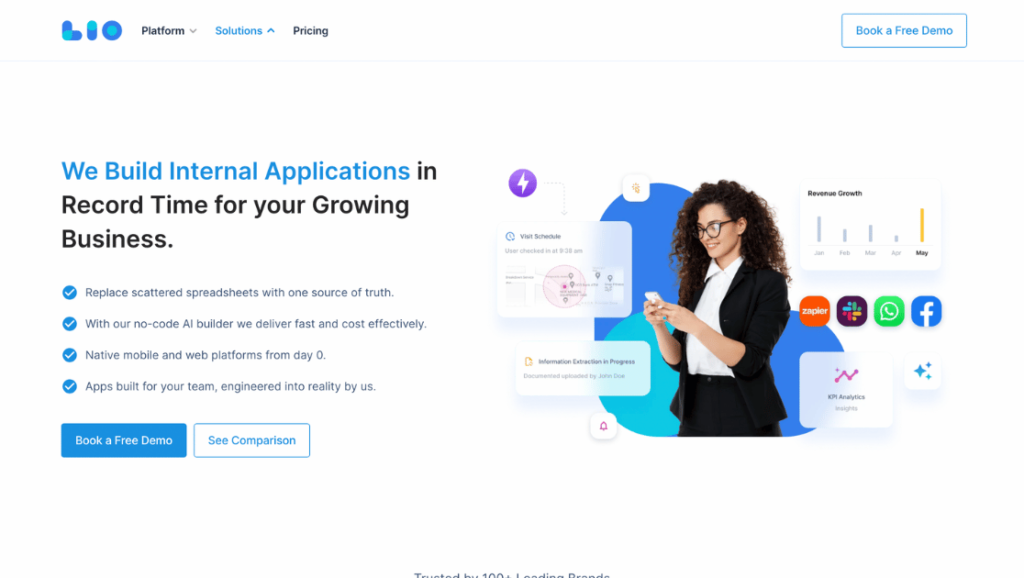CRM Finance | CRM Software for Financial Services Industry
Gaurav Singh Rawat
- May 18, 2024
- 12 Min Read

In today’s highly competitive financial landscape, building strong, lasting relationships with clients is more crucial than ever. Enter Customer Relationship Management (CRM) – a powerful tool that is transforming the way financial institutions interact with their customers.
By leveraging cutting-edge technology and data-driven insights, CRM is helping finance businesses streamline operations, personalize services, and ultimately, drive growth.
What does CRM stand for in financial services?
In the context of financial services, CRM stands for Customer Relationship Management. It refers to the strategies, technologies, and practices that financial institutions use to manage and analyze customer interactions and data throughout the customer lifecycle.
The goal of CRM in finance is to improve customer service, retain customers, and drive sales growth by:
– Centralizing customer data for a 360-degree view
– Automating marketing, sales, and service processes
– Providing personalized financial solutions based on customer preferences and behavior
– Identifying cross-sell and upsell opportunities
– Enhancing team collaboration and productivity
The pivotal role of CRM in your finance business

Streamlining operations and boosting efficiency
CRM system acts as a centralized hub for all customer data, eliminating silos and enabling seamless collaboration across departments.
By automating repetitive tasks such as data entry, lead assignment, and follow-ups, CRM helps your team focus on high-value activities that drive results
Delivering personalized experiences
With deep insights into customer preferences, behavior, and financial history, CRM empowers your business to offer tailored products and services that resonate with each individual.
This level of personalization not only enhances customer satisfaction but also fosters long-term loyalty.

Streamline Financial Ops
Automate processes and streamline operations in your financial institution with our CRM. Boost efficiency, reduce errors, and enhance compliance.
Identifying growth opportunities
CRM’s powerful analytics and reporting capabilities allow you to identify trends, anticipate customer needs, and uncover new revenue streams.
By segmenting your customer base and analyzing their behavior, you can craft targeted marketing campaigns and sales strategies that maximize ROI.
Enhancing customer service
By providing a comprehensive view of each customer’s journey, CRM enables your team to deliver prompt, informed support across all touchpoints.
This level of service not only resolves issues quickly but also builds trust and strengthens relationships. We write an article on field sales employees tracking apps, please read and enhance your tracking system.
Ensuring compliance and security
Financial services are subject to stringent regulations, and CRM helps ensure compliance by providing audit trails, access controls, and secure data storage.
With robust security features, you can protect sensitive customer information and maintain the integrity of your operations.
Choosing the right CRM Software for Financial Services Industry
When selecting a CRM software for financial services industry, consider the following key factors:
– Scalability to accommodate your growth
– Integration with your existing systems and tools
– Customization options to fit your unique processes
– Robust security and compliance features
– User-friendly interface for easy adoption
– Comprehensive analytics and reporting capabilities
By investing in the right CRM solution, your finance business can unlock new levels of efficiency, personalization, and growth. Embrace the power of CRM and revolutionize the way you nurture customer relationships in the financial industry.
The Key Features of CRM for Financial Services
The key features of a CRM software for financial services industry industry include 360-degree customer views, contact and lead management, marketing automation, workflow automation, AI-powered analytics, omnichannel communication, document management, and seamless integration with existing systems.
These features enable personalized service, efficient operations, and data-driven decision making to enhance customer relationships. The key features of a CRM for financial services include:
– 360-Degree View of Financials: Centralized storage of accurate and up-to-date customer data, including transactions, interactions, preferences, products used, income, debts, loans, and credit scores.
– Contact Management: A searchable database of stored client contact information and interaction history.
– Lead Management: Tools for lead acquisition, routing leads to the correct agent or advisor, and tracking leads effectively.
– Customer Engagement: Features that improve customer engagement, such as email newsletters, social media integration, and relationship tracking.
– Workflow Automation: Standardizing business processes, setting automated alerts and reminders for follow-ups, and improving operational efficiency.
– AI and Machine Learning: Tools to assist in analyzing data, identifying trends, and making predictions to enable informed decision-making and tailored financial solutions
– Omnichannel Communication: Integrated communication across various channels to ensure customers can interact with the organization in their preferred manner
– Document Management: Centralized storage and retrieval of essential documents like contracts, proposals, and customer correspondence.
– Analytics and Reporting: Valuable insights into customer behavior, performance metrics, and effectiveness of marketing and sales strategies to support data-driven decisions
– Integration Capabilities: Seamless integration with other systems like core banking, trading platforms, and financial tools to sync data across multiple platforms.
These key features enable financial institutions to enhance customer relationships, streamline operations, ensure compliance, and deliver personalized products and services.

Transform Financial CX
Revolutionize your financial services CX with our cutting-edge CRM. Unify data, automate workflows, and deliver superior customer experiences.
What are the Benefits of using a CRM for Financial Services?
In today’s highly competitive financial landscape, building strong, lasting relationships with customers is more crucial than ever. Customer Relationship Management (CRM) systems have emerged as a powerful tool for financial institutions to streamline operations, personalize services, and ultimately, drive growth.
By leveraging the benefits of CRM, banks, insurance companies, and other financial service providers can gain a 360-degree view of their customers, improve communication, increase efficiency, and make data-driven decisions to enhance customer satisfaction and loyalty. The key benefits of using a CRM system for financial services include:
Better Customer Service and Retention
CRM provides a 360-degree view of every customer, including their financial history, preferences, and interactions. This enables personalized service, quicker issue resolution, and improved customer satisfaction, ultimately leading to higher retention rates.
Increased Efficiency and Productivity
By automating various processes like contact management, lead tracking, and sales forecasting, CRM streamlines operations and reduces manual tasks. This allows financial advisors to focus more on building customer relationships and closing deals.
Enhanced Marketing Efforts
CRM enables targeted marketing campaigns through customer segmentation, personalized messaging, and multi-channel engagement. This improves the effectiveness of marketing initiatives and increases ROI.
Improved Communication and Collaboration
With all customer data centralized in one system, CRM facilitates seamless communication and information sharing across departments. This fosters better teamwork, ensures consistency in customer interactions, and eliminates data silos.
Data-Driven Insights and Decision Making
CRM provides powerful analytics and reporting capabilities, enabling financial institutions to identify trends, anticipate customer needs, and make informed decisions. This data-driven approach optimizes sales strategies, improves forecasting accuracy, and uncovers growth opportunities.
Streamlined Compliance and Security
CRM helps financial services firms maintain regulatory compliance by providing audit trails, secure data storage, and access controls. This reduces the risk of errors, enhances accountability, and protects sensitive customer information.
Increased Sales and Profitability
By enabling targeted cross-selling and upselling, improving lead conversion rates, and optimizing sales processes, CRM ultimately drives revenue growth and profitability for financial services businesses. I would recommend you to read about the top sales CRM softwares for your optimzation.
CRM Software for Financial Services Industry
When selecting a CRM software for financial services industry, it’s crucial to consider various options based on their features, pros, cons, and pricing. Here’s a detailed look at some of the top CRM software in the financial sector
Lio
Features: Lio stands out with its AI-powered custom applications and robust integration capabilities with over 100 applications. It offers both mobile and web access, making it versatile for on-the-go financial professionals.
Pros: The platform is highly customizable and leverages AI for enhanced functionality. It also promises quick deployment.
Cons: Lio may require specific adaptations to fully meet the unique needs of financial services.
Pricing: Pricing is custom, so potential users need to contact the company directly for a quote.


Retain Financial Clients
Improve customer retention in your financial firm with our CRM. Gain a 360-degree view of clients and deliver exceptional, personalized service.
Salesforce Financial Services Cloud
Features: This CRM is equipped with AI-driven analytics, automated workflows, and comprehensive client contact management. It also supports various integrations.
Pros: Salesforce offers extensive features that can be customized to user needs and is accessible via mobile.
Cons: The system can be complex and potentially overwhelming for some users, and it is generally more expensive than some other options.
Pricing: Monthly fees range from $25 to $300 per user.
Wealthbox
Features: Wealthbox provides contact management, task management, automated workflows, and portfolio integration.
Pros: It is user-friendly and particularly suitable for small teams, offering bank-level security.
Cons: It is less robust compared to more comprehensive systems like Salesforce, and there have been some concerns about customer support.
Pricing: Annual billing ranges from $45 to $79 per user per month.
Creatio
Features: Creatio features include multichannel marketing campaigns, retail sales enhancement, and customer service support.
Pros: It excels in comprehensive customer data collection and workflow automation.
Cons: Users need a stable internet connection, and there is a learning curve to fully utilize all features.
Pricing: Starts at $25 per user per month.
Ugru CRM
Features: Ugru offers advanced financial planning tools along with sales and marketing automation.
Pros: It provides an all-in-one suite specifically designed for financial planning.
Cons: Ugru may not be as well-known as other CRM systems and is specifically tailored to financial planning.
Pricing: Pricing starts at $59 per month for three users.
NetSuite CRM
Features: Tailored for financial advisors, NetSuite enhances client relationships and streamlines operations.
Pros: It is specifically designed for financial services, aiding in informed decision-making.
Cons: The pricing may be prohibitive for smaller firms.
Pricing: Custom pricing is available upon request.
Zoho CRM
Features: Zoho incorporates AI technology and complies with stringent security standards, making it a cost-effective choice.
Pros: It is affordable, incorporates AI, and maintains high security standards.
Cons: Some users find it less intuitive, and it may lack advanced features needed by larger firms.
Pricing: There is a free version available; paid plans start at $14 per user per month.
HubSpot CRM
Features: HubSpot offers a free CRM with paid upgrades and integrates well with many applications. It is known for its user-friendly interface.
Pros: The entry-level plan is free, and the CRM is easy to use with good integration capabilities.
Cons: Advanced features require upgrading to paid plans, which can become expensive.
Pricing: The CRM starts free, with paid plans beginning at $45 per month.
Frequently Asked Questions (FAQs)
What is CRM for financial services?
CRM for financial services refers to customer relationship management systems that are specifically designed to meet the needs of financial advisors, banks, insurance companies, and other financial institutions. These systems help manage client relationships, track interactions, and automate administrative tasks to provide personalized advice and build strong client relationships.
Why is CRM important in the financial services industry?
CRM is important in the financial services industry because it helps firms manage complex client data, streamline operations, ensure compliance with regulations, and provide a high level of personalized service. With CRM, financial advisors can focus more on delivering value to their clients rather than on administrative tasks.
How does CRM help financial advisors?
CRM helps financial advisors by providing tools to manage client data, automate workflows, track interactions, and gain insights into client behaviors and preferences. This enables advisors to offer tailored financial advice, improve client engagement, and ultimately grow their business.
Can CRM software integrate with other financial systems?
Yes, many CRM software solutions offer integration capabilities with other financial systems, such as accounting software, portfolio management tools, and banking systems. This allows for seamless data exchange and a more comprehensive view of client information.
What are the key features to look for in financial CRM software?
Key features to look for in financial CRM software include workflow automation, document management, compliance management tools, analytics and reporting, lead and contact management, and the ability to integrate with other financial tools.
How does CRM contribute to regulatory compliance in finance?
CRM contributes to regulatory compliance in finance by providing secure data storage, encryption, and access controls to protect sensitive client information. It also offers document management capabilities and automated reporting features to generate regulatory reports and maintain audit trails.
What are the benefits of using CRM in financial planning?
The benefits of using CRM in financial planning include improved customer relationships, increased efficiency and productivity, enhanced marketing efforts, streamlined compliance, increased sales and profitability, and better data-driven insights.
How much does financial CRM software cost?
The cost of financial CRM software varies depending on the provider, the features offered, the number of users, and the level of customization required. Some CRM solutions offer a free version with basic features, while others require a monthly subscription fee per user.
Can CRM software be customized for specific financial services needs?
Yes, CRM software can often be customized for specific financial services needs. Many CRM systems allow for advanced customization, from custom fields for particular data to unique user interfaces, and no-code development tools for creating distinctive features and apps.
What kind of customer support can I expect with financial CRM software?
The level of customer support varies by CRM provider, but many offer thorough training materials, online resources, and customer support teams to assist with any issues. It’s important to compare customer support ratings of vendors on B2B review platforms such as G2.
Is the Lio app the best CRM software for Financial Services?
Lio’s key strengths for financial services include its ability to quickly build custom apps without coding, pre-built AI capabilities that could potentially analyze financial data and documents, and positive user reviews suggesting it has delivered good ROI for some companies.
However, there are also many established CRM solutions built specifically for financial services, such as Salesforce Financial Services Cloud, that offer industry-specific features and compliance out-of-the-box. For more information about the Lio app, you can call our sales and support team for more information.


